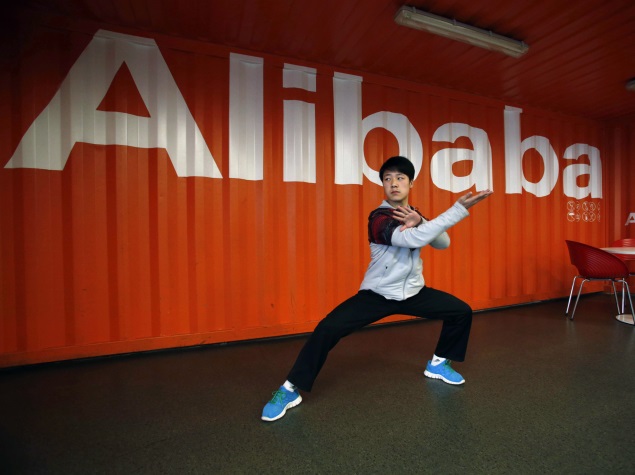- Home
- Internet
- Internet News
- At China's Alibaba, Chairman Jack Ma's Dealings Raise Red Flags
At China's Alibaba, Chairman Jack Ma's Dealings Raise Red Flags

Alibaba, Yahoo and SoftBank settled the matter in 2011, but not before David Einhorn, the Greenlight Capital hedge fund manager, sold all of his Yahoo shares in frustration at what he deemed mutual "finger-pointing" between the companies.
Alibaba reiterated on Tuesday its longstanding position that the 2010 spinoff was intended to conform with central bank regulations.
(Also see: China's Alibaba Expected to Make Bigger US IPO Debut Than Facebook)
But it also said no such rules were in place. "At the time when the licenses were first issued, no such additional regulations governing foreign-owned payment companies had been put in place."
The company declined to comment beyond the prospectus on the matter of Ma's potential conflict or his investments. It also declined to comment on media reports that it is in talks to buy back a stake in the payments firm, or whether Ma would recuse himself from any Alipay talks.
Unwanted attention
Beyond Alipay, analysts and attorneys say they are concerned about Ma and Alibaba's related-party transactions and "variable interest entities" firms associated with Alibaba in which Ma has a holding.
In the prospectus, Alibaba says structures such as "variable interest entities" are to its benefit. The investments give Alibaba flexibility in the face of Chinese regulation. Ma can assume legal ownership of a company and agree to transfer "all economic benefits" to Alibaba when legally permitted, the prospectus said.
According to Tuesday's prospectus, Ma has a 40 percent stake in "several entities" with ties to Yunfeng Capital, an investment firm that has operated alongside Alibaba.
"You've got this complex web of variable interest entities, limited shareholder voting rights," said Jim Angel, associate professor of finance at Georgetown University. "There's definitely a lot of questions over this offering, but there's no doubt that Alibaba is a major e-commerce play."
The deals can be complex. In April Alibaba agreed to loan 6.5 billion yuan (about $1 billion) to co-founder Simon Xie. Through another company formed with Ma, Xie would then purchase a minority stake in Wasu Media Holding Co, an Internet TV firm. Alibaba at the time announced it had reached a cooperation deal with a subsidiary of Wasu. It did not mention the loans or investment.
Alibaba also holds a stake in a separate TV and film company, and M&A lawyers have said the purchase could have been designed to circumvent anti-competition rules.
"This arrangement certainly raises serious questions about corporate governance," a Beijing-based attorney at a multinational law firm said when the investment was made. The person declined to be identified because of the sensitivity of the matter.
"Alibaba's tendency to do these kinds of deals makes the company appear to be cavalier about these kinds of conflicts. Here you have a guy in senior management taking 6 billion yuan out of his company to make an investment in another firm that he controls."
Ma's investments do not ring alarm bells for everyone.
"This is one of those risk factors they have to tell you about, but you don't have to worry about it as long asJack Ma retains a meaningful stake in Alibaba," said Lise Buyer, an IPO adviser who guided Google Inc's 2004 offering.
"This seems to me that something investors should be aware of, but not something they should be particularly nervous about at this stage in the company's life," Buyer said. "Call me in a year."
But Buyer raised another issue the fact that Alibaba had just four board members. It intends to expand that to nine, but investors should wait to see who gets appointed before its listing, she said.
"It would be nice to see that before putting your money down," she said.
© Thomson Reuters 2014
For the latest tech news and reviews, follow Gadgets 360 on X, Facebook, WhatsApp, Threads and Google News. For the latest videos on gadgets and tech, subscribe to our YouTube channel. If you want to know everything about top influencers, follow our in-house Who'sThat360 on Instagram and YouTube.
Related Stories
- Samsung Galaxy Unpacked 2025
- ChatGPT
- Redmi Note 14 Pro+
- iPhone 16
- Apple Vision Pro
- Oneplus 12
- OnePlus Nord CE 3 Lite 5G
- iPhone 13
- Xiaomi 14 Pro
- Oppo Find N3
- Tecno Spark Go (2023)
- Realme V30
- Best Phones Under 25000
- Samsung Galaxy S24 Series
- Cryptocurrency
- iQoo 12
- Samsung Galaxy S24 Ultra
- Giottus
- Samsung Galaxy Z Flip 5
- Apple 'Scary Fast'
- Housefull 5
- GoPro Hero 12 Black Review
- Invincible Season 2
- JioGlass
- HD Ready TV
- Laptop Under 50000
- Smartwatch Under 10000
- Latest Mobile Phones
- Compare Phones
- Moto G15 Power
- Moto G15
- Realme 14x 5G
- Poco M7 Pro 5G
- Poco C75 5G
- Vivo Y300 (China)
- HMD Arc
- Lava Blaze Duo 5G
- Asus Zenbook S 14
- MacBook Pro 16-inch (M4 Max, 2024)
- Honor Pad V9
- Tecno Megapad 11
- Redmi Watch 5
- Huawei Watch Ultimate Design
- Sony 65 Inches Ultra HD (4K) LED Smart TV (KD-65X74L)
- TCL 55 Inches Ultra HD (4K) LED Smart TV (55C61B)
- Sony PlayStation 5 Pro
- Sony PlayStation 5 Slim Digital Edition
- Blue Star 1.5 Ton 3 Star Inverter Split AC (IC318DNUHC)
- Blue Star 1.5 Ton 3 Star Inverter Split AC (IA318VKU)

















